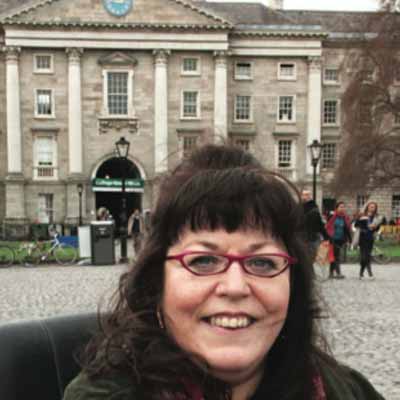Interviews
 Name: Rosaleen McDonagh
Name: Rosaleen McDonagh
TCD Qualifications: B.A. Biblical and Theological Studies, M.Phil. Ethnic & Racial Studies, M.Phil Creative Writing
About: Rosaleen McDonagh is a playwright and activist. Originally from Sligo, Rosaleen is the fourth eldest in a family of twenty children. She worked in Pavee Point Traveller & Roma Centre for ten years managing the Violence Against Women programme and remains a board member. Rosaleen has a B.A. in Biblical & Theological Studies, an M.Phil in Race, Ethnicity and Conflict & an M.Phil in Creative Writing, all from Trinity. In 2017 she was election to Aosdána. Roseleen was nominated by poet, Michael O’Loughlin and writer, Colm McCann and is the first Irish Traveller to receive this honour.
Ethnic status is a big interest area for you, tell us why?
Ethnic status is very important for everyone. Traveller ethnicity has always been precious to me. It took half my life to fight for official state recognition and resources. Ethnic identifiers in official state systems and apparatus, allow people to identify themselves. It reduces the possibility of racist, ethnic profiling. It also allows the state to plan services in a more inclusive, respectful way. Identity, regardless of how one expresses it, is one of the most valuable possessions to us as humans. For so long, we members of the Traveller community were denied our identity as a minority ethnic group in Ireland, there were many fallouts from this; namely racism – which meant lack of access to service provision, particularly in the area of education.
What made you decide to study the M.Phil in Race, Ethnicity and Conflict and how did it further ignite your interest in the area?
Being very late to mainstream education, it was a huge struggle academically. Yet thankfully the M.Phil programme was extremely supportive. Dr Ronit Lentin and Dr Andrew Finlay were extremely patient and encouraging. Vista of readings opened up - bell hooks, Angela Davis, Patricia Hill Collins and Gloria Steinem - all stalwarts of the feminist, critical and race cannon. Dr Finlay’s module on Irish identity, afforded me the opportunity to think and write a response regarding the representation and resistance in the context of Traveller identity & ethnicity.
What has been your proudest moment in your career to date?
Having my family at my graduation where I received my degrees. There was no precedent back then for Traveller women returning to education or endeavouring on a third level academic journey. In my time, at University, there was no anti-racist legislation. During this epoch, it was dangerous to be out or flamboyant with your Traveller identity. I was very out about being a Traveller. The proudest moment was hearing a couple of years ago that there are other Travellers studying at Trinity.
Where did you get your inspiration for your latest play, Mainstream?
It was supposed to be a response to the culture of documentary, or as we like to call them “mockumentary”. There was something very cruel about, ‘My Big Fat Gipsy Wedding’, ‘Knuckles’, ‘The Undateables’ and ‘Benefits Street’. These were prurient and they objectified poor people who often were exploited by the outside judgemental gaze. It was meant to be a parody of these documentary makers. My play, Mainstream, is a piece of fiction based on real and imagined lives. It’s a love story that endures pain and the pressure to assimilate. It attempts to honour and respect the Traveller and disability aesthetics with a limited and certain type of authenticity.
What is your biggest inspiration for your writing?
My reading, my family, the absence of Traveller narratives in popular literature, particularly fiction. We are there as the rogue, the tinker, and the thief. All written by settled writers for a settled reader. It really is very difficult to enjoy literature where your identity or some outsiders notion of your identity is being presented in a pejorative, exploitative, one dimensional narrative. The disabled female aesthetic. The notion of how individuals struggle and often break cultural norms. I like subverting the aesthetic. Mixing or at least attempting to blend the fictional with the polemic.
What projects are you working on currently?
Finishing my Ph.D. About to start a Writer in Residence Programme with the Irish Writers Centre and the Irish Wheelchair Association. Working on my play ‘Protégée’, with Fishamble Theatre Company, which is an adaptation of Colum McCann’s novel Zoli, which is the story of a Polish Roma Gypsy poet and writer. This piece goes into production in 2019. I’m busy. I’m always busy.

